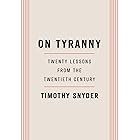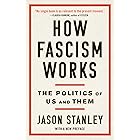| Digital List Price: | $17.95 |
| Kindle Price: | $9.15 Save $8.80 (49%) |
| Sold by: | Amazon.com Services LLC |
Your Memberships & Subscriptions

Download the free Kindle app and start reading Kindle books instantly on your smartphone, tablet, or computer - no Kindle device required.
Read instantly on your browser with Kindle for Web.
Using your mobile phone camera - scan the code below and download the Kindle app.

OK
 Audible sample Sample
Audible sample Sample 


Strongmen: Mussolini to the Present Kindle Edition

Explore your book, then jump right back to where you left off with Page Flip.
View high quality images that let you zoom in to take a closer look.
Enjoy features only possible in digital – start reading right away, carry your library with you, adjust the font, create shareable notes and highlights, and more.
Discover additional details about the events, people, and places in your book, with Wikipedia integration.
What modern authoritarian leaders have in common (and how they can be stopped).
Ruth Ben-Ghiat is the expert on the "strongman" playbook employed by authoritarian demagogues from Mussolini to Putin—enabling her to predict with uncanny accuracy the recent experience in America and Europe. In Strongmen, she lays bare the blueprint these leaders have followed over the past 100 years, and empowers us to recognize, resist, and prevent their disastrous rule in the future.
For ours is the age of authoritarian rulers: self-proclaimed saviors of the nation who evade accountability while robbing their people of truth, treasure, and the protections of democracy. They promise law and order, then legitimize lawbreaking by financial, sexual, and other predators.
They use masculinity as a symbol of strength and a political weapon. Taking what you want, and getting away with it, becomes proof of male authority. They use propaganda, corruption, and violence to stay in power.
Vladimir Putin and Mobutu Sese Seko’s kleptocracies, Augusto Pinochet’s torture sites, Benito Mussolini and Muammar Gaddafi’s systems of sexual exploitation, and Silvio Berlusconi and Donald Trump’s relentless misinformation: all show how authoritarian rule, far from ensuring stability, is marked by destructive chaos.
No other type of leader is so transparent about prioritizing self-interest over the public good. As one country after another has discovered, the strongman is at his worst when true guidance is most needed by his country.
Recounting the acts of solidarity and dignity that have undone strongmen over the past 100 years, Ben-Ghiat makes vividly clear that only by seeing the strongman for what he is—and by valuing one another as he is unable to do—can we stop him, now and in the future.
- ISBN-13978-0393868418
- PublisherW. W. Norton & Company
- Publication dateNovember 10, 2020
- LanguageEnglish
- File size13068 KB
Customers who bought this item also bought
 Authoritarians hold appeal when society is polarized, or divided into two opposing ideological camps, which is why they do all they can to exacerbate strife.Highlighted by 1,148 Kindle readers
Authoritarians hold appeal when society is polarized, or divided into two opposing ideological camps, which is why they do all they can to exacerbate strife.Highlighted by 1,148 Kindle readers Mussolini prepared the script used by today’s authoritarians that casts the leader as a victim of his domestic enemies and of an international system that has cheated his country.Highlighted by 1,046 Kindle readers
Mussolini prepared the script used by today’s authoritarians that casts the leader as a victim of his domestic enemies and of an international system that has cheated his country.Highlighted by 1,046 Kindle readers Strongman national projects generally leverage three time frames and states of mind: utopia, nostalgia, and crisis.Highlighted by 900 Kindle readers
Strongman national projects generally leverage three time frames and states of mind: utopia, nostalgia, and crisis.Highlighted by 900 Kindle readers
From the Publisher

|
|
|
|
|---|---|---|
|
|
|
|

Editorial Reviews
Review
― Daniel Ziblatt, co-author of How Democracies Die
"What separates this book from the many others that examine tyrants and tyranny―is the analysis that puts this phenomenon in perspective."
― David M. Shribman, Boston Globe
"Simultaneously intimate and sweeping in scope.…Ruth Ben-Ghiat’s clear prose rings with a rhythm and cadence that today’s nonfiction too often lacks."
― Sarah Chayes, author of On Corruption in America and Thieves of State
"Ben-Ghiat teaches us about the leaders.…[She] cogently states that the secret of the strongman is that he needs the crowds much more than they need him."
― Federico Finchelstein, New Republic
"Rich in anecdote.…Ms. Ben-Ghiat is at her most persuasive when she writes of the importance of the strongman’s cult of personality."
― Tunku Varadarajan, Wall Street Journal
"A surpassingly brilliant public intellectual."
― Virginia Heffernan, Slate Trumpcast
"For the reader inured by the drip-drip-drip of stories of brazen corruption over the course of years, it is bracing to see a half-decade’s worth of reporting so carefully distilled.…Ben-Ghiat does not shy away from revealing America’s role in enabling dictatorships around the world.…It’s a chilling current through the book and one that pricks the conscience of a reader."
― Talia Lavin, Washington Post
"Everyone who cares about American democracy should read this book."
― Sarah Kendzior, author of Hiding in Plain Sight
"Ruth Ben-Ghiat delivers a superb examination of how close the US came to fascism―and how it has propped it up before."
― Charles Kaiser, Guardian
"Deep insight and a vigorous style…[A] brilliant contribution to the political psychology of democracy."
― Joy Connolly, president of the American Council of Learned Societies
"Ruth Ben-Ghiat…specializes in male menace."
― Jon Blitzer, The New Yorker
"A timely analysis of how a certain kind of charisma delivers political disaster."
― Timothy Snyder, author of On Tyranny
About the Author
Product details
- ASIN : B08BVZMDWW
- Publisher : W. W. Norton & Company (November 10, 2020)
- Publication date : November 10, 2020
- Language : English
- File size : 13068 KB
- Text-to-Speech : Enabled
- Screen Reader : Supported
- Enhanced typesetting : Enabled
- X-Ray : Not Enabled
- Word Wise : Enabled
- Sticky notes : On Kindle Scribe
- Print length : 368 pages
- Best Sellers Rank: #42,571 in Kindle Store (See Top 100 in Kindle Store)
- #8 in 21st Century World History
- #20 in Political History (Kindle Store)
- #25 in 20th Century World History
- Customer Reviews:
About the author

Ruth Ben-Ghiat is a historian and commentator on fascism, authoritarian leaders, propaganda, and democracy protection in America and around the world. The recipient of Guggenheim, Fulbright, and other fellowships, she is author or editor of seven books. She is an MSNBC columnist and also writes for CNN, The Atlantic, the Washington Post, the New Yorker and other outlets. She's Professor of History and Italian Studies at New York University, Advisor to Protect Democracy, and publisher of the Substack newsletter Lucid on threats to democracy. She is also a consultant for TV and film: Guillermo del Toro's Oscar-winning Pinocchio was her most recent project. Follow her on IG, Threads and Twitter @ruthbenghiat
Customer reviews
Customer Reviews, including Product Star Ratings help customers to learn more about the product and decide whether it is the right product for them.
To calculate the overall star rating and percentage breakdown by star, we don’t use a simple average. Instead, our system considers things like how recent a review is and if the reviewer bought the item on Amazon. It also analyzed reviews to verify trustworthiness.
Learn more how customers reviews work on AmazonReviews with images
-
Top reviews
Top reviews from the United States
There was a problem filtering reviews right now. Please try again later.
“Strongmen” is an excellent book that reveals the “strongman” playbook used by authoritarian leaders from Mussolini to Putin and how that is being played out in America. Historian, MSNBC columnist, author, professor and with expertise of fascism, Ruth Ben-Ghiat provides readers with a fascinating look into how these men obtained power, destroy democracies in order to maintain power and what we can do to preserve democracy. This instructive 400-page book contains ten chapters broken out into the following three parts: I. Getting to Power, II. Tools of Rule, and III. Losing Power.
Positives:
1. A well-written and researched book.
2. A fascinating topic, how to recognize and combat authoritarian ascendance, better known as fascism.
3. Ruth Ben-Ghiat is an expert on this topic and it shows. Her writing style is easy to follow; each chapter basically represents an authoritarian or a fascist related topic.
4. The book is well organized. In general, it provides a well thought-out diagnosis of what fascism is and the potential cure. It provides extras that I wish more books would provide: Protagonists, Conclusion, Abbreviations, Notes and Selected Bibliography.
5. The author’s main purpose of the book is to reveal patterns of authoritarianism. ““NO HISTORIAN CAN GET INSIDE the heads of the dead . . . But with sufficient documentation, we can detect patterns of thought and action,” writes Robert Darnton. This book aims to do just that by looking at the evolution of authoritarianism, defined as a political system in which executive power is asserted at the expense of the legislative and judicial branches of government.”
6. Provides a list of the protagonists (authoritarian leaders of mainly prominent nations) of the book and how each has put their own mark on the authoritarian playbook.
7. Describes what is consistent among all authoritarians. “On one issue, the strongman has been consistent: his drive to control and exploit everyone and everything for personal gain.”
8. Describes the history of fascism. How it came to be. “Yet Mussolini, a former Socialist, knew the power of insurrectionary language to mobilize people. He pitched Fascism as “both subversive and conservative”: it favored national unity instead of class conflict, imperialism and force instead of international solidarity, and promised modernization without loss of tradition.”
9. Describes military coups as the main characteristic of the second strongman era. “World War I had created the conditions for the age of fascist takeovers, and World War II prepared the age of military coups.” Bonus, “Takeover by coup paid off for Gaddafi and Pinochet, who stayed in office for forty-two and seventeen years, respectively.”
10. Describes the existing era of strongmen. “WITH MILITARY COUPS LESS COMMON by the time Pinochet left office in 1990, elections became the way a new generation of strongmen would come to power.”
11. Interesting and telling historical observations. “The Hitler salute made clear who the enemies were, since by 1937 Jews were banned from performing it. Yet, as in Herr S.’s dream, its real aim was to sap everyone’s dignity and damage the bonds of civil society—a crucial goal of every authoritarian regime.”
12. Describes the characteristics of a strongman. “Strongman national projects generally leverage three time frames and states of mind: utopia, nostalgia, and crisis.” “Nostalgia for better times is also part of the equation, since the ruler’s vow is to make the country great again. This involves the fantasy of returning to an age when male authority was secure and women, people of color, and workers knew their places.”
13. The art of propaganda. One of the best chapters I’ve read on such a topic. “For one hundred years, authoritarian leaders have invested in propaganda to instill loyalty and fear, motivating people to carry out their agendas of nationalization, persecution, and thievery.” “At its core, propaganda is a set of communication strategies designed to sow confusion and uncertainty, discourage critical thinking, and persuade people that reality is what the leader says it is.”
14. Describes virility as a tool of the authoritarian, exemplified by misogyny. “So was Berlusconi’s 2009 warning to Italian women that the state could not protect them from sexual assault, hinting that their own attractiveness made them fair game: “We can’t deploy a big military force to avoid rapes. We’d have to have as many soldiers in the street as there are beautiful Italian women.””
15. Authoritarians and corruption. “Strongmen use corruption in tandem with other tools. Purges of the judiciary result in a justice system that exonerates crooks or doesn’t prosecute them at all. Journalists and activists who might expose thievery are imprisoned or smeared through propaganda. Virility makes taking what you want and getting away with it the measure of manhood.”
16. The use of violence. “Propaganda encourages everyone in the country to see violence differently: as a national and civic duty and the price of making the country great.” “Italy had a tradition of Catholic anti-Judaic sentiment, but no Eastern European–style pogroms in its history. Mussolini launched an intensive propaganda campaign to prepare his people to see Jews as a threat to their well-being.”
17. Describes resistance movements against authoritarians. “Most resistance in strongman states is non-violent, though, and unarmed protest has been among the most effective.”
18. The end of authoritarian rule. “Nothing prepares the ruler to see his propaganda ignored and his charismatic hold weaken until he loses control of the nation and is hunted by his own people, as happened to Mussolini and Gaddafi.”
19. An excellent Conclusion chapter. “The drive to accumulate and control bodies, territory, and wealth is a hallmark of strongman rule.”
20. Describes how to stop fascism. “TO OPPOSE AUTHORITARIANS EFFECTIVELY, we must have a clear-eyed view of how they manage to get into power and stay there.” “TO COUNTER AUTHORITARIANISM, we must prioritize accountability and transparency in government. At the heart of strongman rule is the claim that he and his agents are above the law, above judgment, and not beholden to the truth.”
Negatives:
1. As with most books of this ilk; the diagnosis is much more complete and satisfying than the cure.
2. This book is intended for the layperson and was written to be accessible. So if you are looking for an in depth analysis of fascism this is not your book. Otherwise, it’s another positive.
3. Emphasis on Italy (within reason) and European powers at the expense of African leaders (though Qaddafi was covered at length); very little was said of Idi Amin, and Barre as an example.
4. Lacks charts and diagrams.
In summary, I really enjoyed this book. It’s an excellent refresher of recent authoritarians (100 years back or so). Ruth Ben-Ghiat should be commended for making the topic of fascism accessible and interesting for the masses while educating us on the existing threat within our own borders. I highly recommend it!
Further recommendations: “Fascism” by Madeleine Albright, “On Tyranny: Twenty Lessons from the Twentieth Century” by Timothy Snyder, “Bloodlands” by the same author, “American Fascists” by Chris Hedges, “How Democracies Die” by Steven Levitsky, “No Is Not Enough” by Naomi Klein, “Democracy in Chains” by Nancy MacLean, and “The Invention of Russia: The Rise of Putin and the Age of Fake News”.
What it boils down to, Trump is nothing more than an authoritarian/fascist and his campaign is based on fascism. Once we address the elephant in the room, the sooner we can stop this nonsense of having him eligible to be president again.
This book is a wakeup call to current politics and everyone who is eligible to vote - this is a must read!!!!!
Instead of organizing by time (decades, years or eras), by country or by person, the author reviews the development of authoritarian rule and examines techniques of the strongman. She also dissects the end of authoritarian regimes and how to offset authoritarian “creep”. In her Acknowledgement section (some of us read this) she mentioned how her family lived with stacks of books about specific individuals. She successfully avoided a “been there did that“ treatment in this work.
If the subject and history were not difficult enough, the reports of violence made reading a tough go. Research and writing about these incidents had to have been incredibly onerous. Thanks to Ben-Ghiat for editing these to reportorial brevity. When over one third of the book is reference, notes, citations, etc., the reader can trust the precision of the author’s presentation.
As I said earlier this is a difficult read. Agatha Christie she is not. She doesn’t hide clues to reveal in the end; instead she displays all facts and connections for the reader to see. She doesn’t tie it all up in a rainbows and unicorn ending. But she does end with clear hope and optimism that in this fight (and it is clear that this is a fight) right, justice and democracy can prevail.
Read this book at least twice.
Top reviews from other countries
Well, I still want to read that book someday. It's not this one, though many parts of the explanation have their moment in Ben-Ghiat's limelight. Strongmen (the book) is built differently - as a series of short examples of behavior (i.e. mis-behavior) of wannabe and actual dictators of the past 100 years. It felt like flashes of intense light in a dark cave, briefly illuminating some subject (usually with little or no introduction), then winking out and the next flash beginning. If (like me) you don't already know the historical figures and events and chronology that pile into your brain, it's - well, it's a pile.
But it works in its own way. As a collage. A picture of the authoritarian, the "strongman" emerges from all the images. Not just of how he snatches power, but of his playbook while in power, and when power ebbs away. A picture that we need to know and recognize in order to impede, and maybe prevent, the next despot from stealing our democracy. (Though we still need, in addition, the analytical book on how it happens.)
On a different topic you will quickly see, on scanning Ben-Ghiat's list of villains, that she has left out many. Many many - there are too many even to name. For example, all the socialist and communist dictators of recent and current memory - Stalin, Chavez, Mao, Pol Pot, Kim and so many more. Would they add something else to the picture, or are they identical clones?
And why (other than the page limit) confine the story to the last century? The strongmen of the past didn't call themselves fascists, they often called themselves kings or emperors. It is hardly a new phenomenon or a new story. It's something fundamental in humans. As is, I guess, its cure. We need to know both with razor clarity.
Happy reading.

















